
After independence in 1966, Guyana sought an influential role in international affairs, particularly among Third World and non-aligned nations. It served twice on the UN Security Council. Former Vice President, Deputy Prime Minister, and Attorney General Mohamed Shahabuddeen served a 9-year term on the International Court of Justice (1987–96). In June 2023, Guyana was elected as a non-permanent member to the UN Security Council. The country will serve on the Council for a period of two years, beginning in January of 2024.

The AIDS epidemic, caused by HIV, found its way to the United States between the 1970s and 1980s, but was first noticed after doctors discovered clusters of Kaposi's sarcoma and pneumocystis pneumonia in homosexual men in Los Angeles, New York City, and San Francisco in 1981. Treatment of HIV/AIDS is primarily via the use of multiple antiretroviral drugs, and education programs to help people avoid infection.

The United States President's Emergency Plan For AIDS Relief (PEPFAR) is a United States governmental initiative to address the global HIV/AIDS epidemic and help save the lives of those suffering from the disease. Launched by U.S. President George W. Bush in 2003, as of May 2020, PEPFAR has provided about $90 billion in cumulative funding for HIV/AIDS treatment, prevention, and research since its inception, making it the largest global health program focused on a single disease in history until the COVID-19 pandemic. PEPFAR is implemented by a combination of U.S. government agencies in over 50 countries and overseen by the Global AIDS Coordinator at the United States Department of State. As of 2023, PEPFAR has saved over 25 million lives, primarily in sub-Saharan Africa.
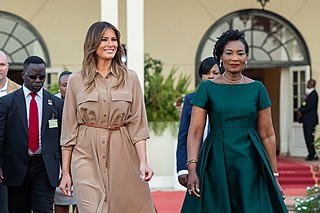
The United States established diplomatic relations with Malawi in 1964 after Malawi gained independence from the United Kingdom. Malawi's transition from a one-party state to a multi-party democracy significantly strengthened the already cordial U.S. relationship with Malawi. Significant numbers of Malawians study in the United States. The United States has an active Peace Corps program, Centers for Disease Control and Prevention, Department of Health and Human Services, and an Agency for International Development (USAID) mission in Malawi. Both countries have a common history and English language, as they were part of the British Empire.

United States–Zimbabwe relations are bilateral relations between Zimbabwe and the United States. Both countries share a common history and language as former British colonies.

The diplomatic relationship between the United States of America and Zambia can be characterized as warm and cooperative. Relations are based on their shared experiences as British colonies, both before, after and during the struggle for independence. Several U.S. administrations cooperated closely with Zambia's first president, Kenneth Kaunda, in hopes of facilitating solutions to the conflicts in Rhodesia (Zimbabwe), Angola, and Namibia. The United States works closely with the Zambian Government to defeat the HIV/AIDS pandemic that is ravaging Zambia, to promote economic growth and development, and to effect political reform needed to promote responsive and responsible government. The United States is also supporting the government's efforts to root out corruption. Zambia is a beneficiary of the African Growth and Opportunity Act (AGOA). The U.S. Government provides a variety of technical assistance and other support that is managed by the Department of State, U.S. Agency for International Development, Millennium Challenge Account (MCA) Threshold Program, Centers for Disease Control and Prevention, Department of Treasury, Department of Defense, and Peace Corps. The majority of U.S. assistance is provided through the President's Emergency Plan for AIDS Relief (PEPFAR), in support of the fight against HIV/AIDS.
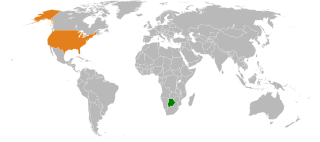
According to the 2012 U.S. Global Leadership Report, 79% of Botswana people approve of U.S. leadership, with 8% disapproving and 13% uncertain.

Equatorial Guinea – United States relations are bilateral relations between Equatorial Guinea and the United States.

Bilateral relations have been established between Guyana and the United States of America.

Namibia – United States relations are bilateral relations between Namibia and the United States.
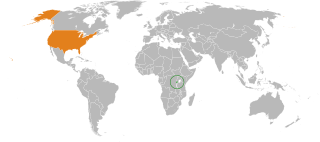
Rwanda–United States relations are bilateral relations between Rwanda and the United States.

Sierra Leone – United States relations are bilateral relations between Sierra Leone and the United States.

Togo–United States relations are bilateral relations between Togo and the United States.
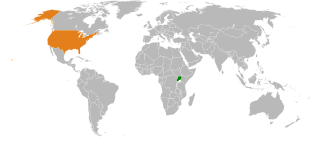
Uganda – United States relations are bilateral diplomatic, economic, social and political relations between Uganda and the United States.
Jimmy J. Kolker is an American diplomat. He was the ambassador to Burkina Faso from 1999 to 2002 and Uganda from 2002 to 2005. He was Chief of the HIV/AIDS Section at UNICEF’s New York headquarters from 2007 to 2011. From 2011 to 2017, Ambassador Kolker was Assistant Secretary for Global Affairs, U.S. Department of Health and Human Services in Washington, DC.
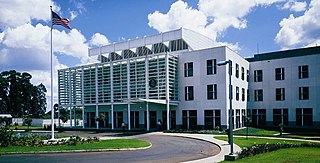
The Embassy of the United States of America in Nairobi, located in Nairobi, is home to the diplomatic mission of the United States to the Republic of Kenya. The embassy opened in central Nairobi on 2 March 1964, when the United States established diplomatic relations with Kenya. In 1998, the original embassy was the target of a terrorist attack, after which a new embassy building was constructed in Gigiri, a suburb of Nairobi, in 2003.
The Embassy of the United States in Lusaka is the diplomatic mission of the United States of America in Zambia. U.S. foreign policy goals in Zambia are focused on reducing poverty, supporting democratic governance, improving water and sanitation infrastructure, and combating the HIV/AIDS pandemic, which is widespread in Zambia.
The Embassy of the United States in Maputo is the diplomatic mission of the United States of America in Mozambique.

The Embassy of the United States in Mbabane is the diplomatic mission of the United States of America in Eswatini. A significant focus involves collaborative efforts in combating the spread of HIV/AIDS, as Eswatini faces the challenge of the world's highest estimated rate of HIV.

















